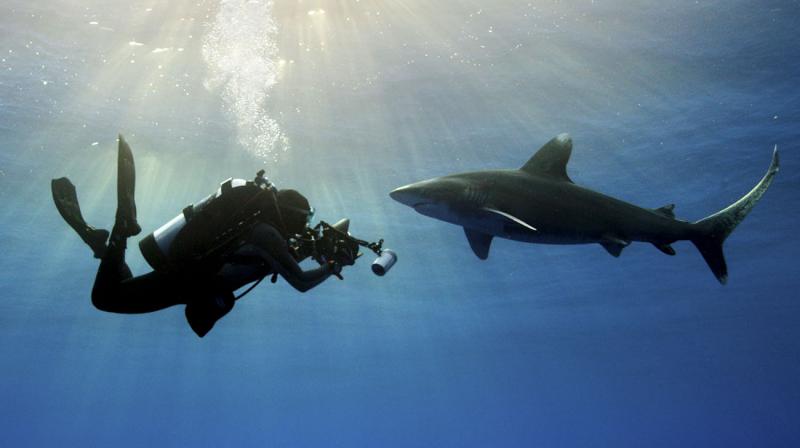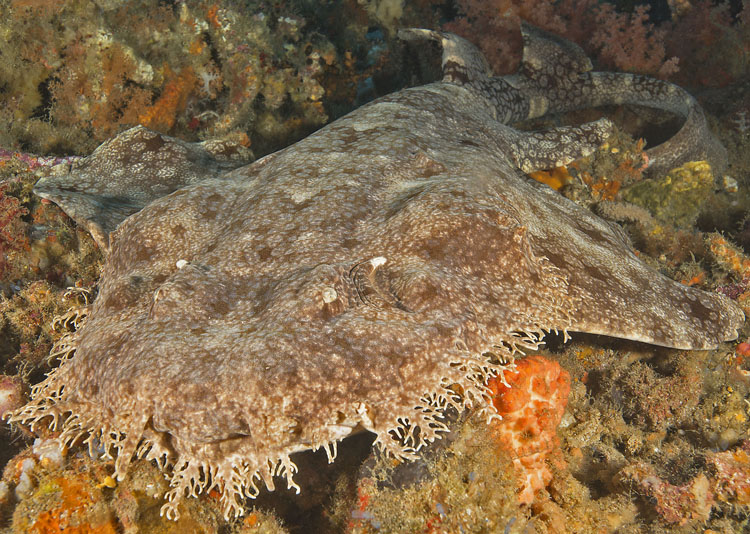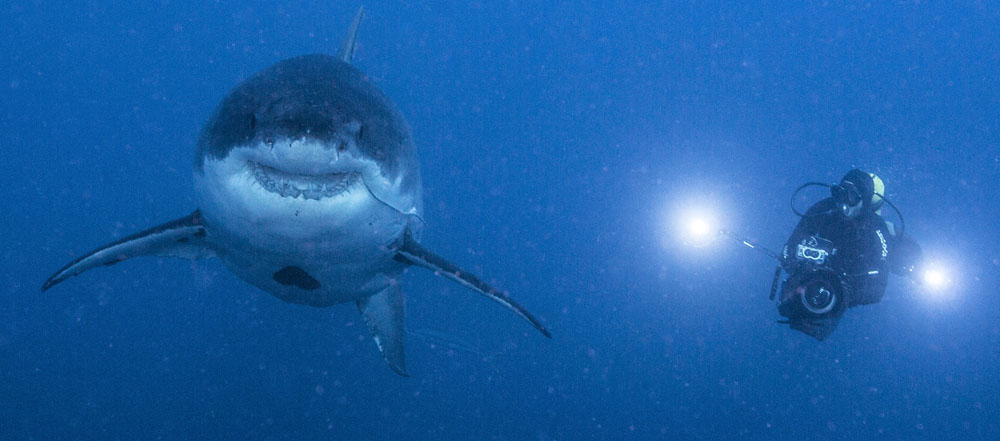Shark, BBC One | reviews, news & interviews
Shark, BBC One
Shark, BBC One
Astounding revelations about the 510 species of the ocean's top predator

It is perhaps a clever piece of ironic perversity to have scheduled the first part of a three-part documentary on sharks on polling day, but the subject here is the comings and goings inside the complex world of the predators of the sea. The series is an amazing feat on the part of the BBC Natural History Unit, in tandem with the Discovery Channel.
The images from under the ice in the Arctic to the South African ocean and the Great Barrier Reef are in themselves awesomely beautiful and mysterious, as we investigate the natural world in ways that were never possible before the revolutionary advances in cameras and other equipment. It is also the 40th anniversary of Jaws, the film that encouraged an uninformed worldwide horror of sharks. And now sharks everywhere are threatened, even though their survival record hitherto has been impeccable. Several species are almost literally living fossils, their biology unchanged from 400 to 100 million years ago.
 There are 510 different species of sharks and rays, the programme examining a mere 30 or so from all over the world. The smallest shark could fit into the palm of our hand; the largest is over 40 foot long; and the fastest, the Mako shark which hunts tuna in the open ocean, can travel at over 40mph, as attested by a motorboat trailing a speedometer. Dolphins can manage a mere 20mph. The epaulette shark can walk on land as it traverses from tidal pool to tidal pool on the Great Barrier Reef, while the six-foot-long blacktip sharks band together to feast off 10-million-strong anchovy shoals traversing the South African oceans.
There are 510 different species of sharks and rays, the programme examining a mere 30 or so from all over the world. The smallest shark could fit into the palm of our hand; the largest is over 40 foot long; and the fastest, the Mako shark which hunts tuna in the open ocean, can travel at over 40mph, as attested by a motorboat trailing a speedometer. Dolphins can manage a mere 20mph. The epaulette shark can walk on land as it traverses from tidal pool to tidal pool on the Great Barrier Reef, while the six-foot-long blacktip sharks band together to feast off 10-million-strong anchovy shoals traversing the South African oceans.
From a coral reef in Melanesia, there was astonishing film of the Tasselled Wobbegong shark (pictured above) which is camouflaged to look like coral, lying in ambush to snatch dinner. The reefs also harbour whitetip sharks who hunt in the dark in a mob, detecting their prey by sensing the electrical charges given off by the frightened heart of the victim. Half a mile under the Arctic ice there are Greenland sharks, blinded by little white parasites attached to and eating their eyes. These scavenger can live for up to 200 years, at pressures 100 times greater than those on land.
 The climax was the Great White shark (pictured above with nervous cameraman) chasing the fur seals feeding in the open ocean off Cape Storm, South Africa. We witnessed the incredible sight of a huge one-ton shark, travelling at 20mph, leaping out of the sea to bring down a seal in mid-air. All that remained was the victim's blood pooling across the ocean’s surface.
The climax was the Great White shark (pictured above with nervous cameraman) chasing the fur seals feeding in the open ocean off Cape Storm, South Africa. We witnessed the incredible sight of a huge one-ton shark, travelling at 20mph, leaping out of the sea to bring down a seal in mid-air. All that remained was the victim's blood pooling across the ocean’s surface.
The amount of information imparted was prodigious, though as ever the BBC couldn't leave well enough alone. Composer Will Slater was doubtless working to a brief, but the background music was melodramatic, overwrought and often completely unnecessary, while the voice-over was studded with clichés about “the world beneath the waves ruled by strange fearsome creatures”. Nonetheless, there's plenty more to look forward in the two remaining films, which promise to explore shark society, from networks of communication to family life.
rating
Explore topics
Share this article
Add comment
The future of Arts Journalism
You can stop theartsdesk.com closing!
We urgently need financing to survive. Our fundraising drive has thus far raised £49,000 but we need to reach £100,000 or we will be forced to close. Please contribute here: https://gofund.me/c3f6033d
And if you can forward this information to anyone who might assist, we’d be grateful.

Subscribe to theartsdesk.com
Thank you for continuing to read our work on theartsdesk.com. For unlimited access to every article in its entirety, including our archive of more than 15,000 pieces, we're asking for £5 per month or £40 per year. We feel it's a very good deal, and hope you do too.
To take a subscription now simply click here.
And if you're looking for that extra gift for a friend or family member, why not treat them to a theartsdesk.com gift subscription?
more TV
 Murder Before Evensong, Acorn TV review - death comes to the picturesque village of Champton
The Rev Richard Coles's sleuthing cleric hits the screen
Murder Before Evensong, Acorn TV review - death comes to the picturesque village of Champton
The Rev Richard Coles's sleuthing cleric hits the screen
 Black Rabbit, Netflix review - grime and punishment in New York City
Jude Law and Jason Bateman tread the thin line between love and hate
Black Rabbit, Netflix review - grime and punishment in New York City
Jude Law and Jason Bateman tread the thin line between love and hate
 The Hack, ITV review - plodding anatomy of twin UK scandals
Jack Thorne's skill can't disguise the bagginess of his double-headed material
The Hack, ITV review - plodding anatomy of twin UK scandals
Jack Thorne's skill can't disguise the bagginess of his double-headed material
 Slow Horses, Series 5, Apple TV+ review - terror, trauma and impeccable comic timing
Jackson Lamb's band of MI5 misfits continues to fascinate and amuse
Slow Horses, Series 5, Apple TV+ review - terror, trauma and impeccable comic timing
Jackson Lamb's band of MI5 misfits continues to fascinate and amuse
 Coldwater, ITV1 review - horror and black comedy in the Highlands
Superb cast lights up David Ireland's cunning thriller
Coldwater, ITV1 review - horror and black comedy in the Highlands
Superb cast lights up David Ireland's cunning thriller
 Blu-ray: The Sweeney - Series One
Influential and entertaining 1970s police drama, handsomely restored
Blu-ray: The Sweeney - Series One
Influential and entertaining 1970s police drama, handsomely restored
 I Fought the Law, ITVX review - how an 800-year-old law was challenged and changed
Sheridan Smith's raw performance dominates ITV's new docudrama about injustice
I Fought the Law, ITVX review - how an 800-year-old law was challenged and changed
Sheridan Smith's raw performance dominates ITV's new docudrama about injustice
 The Paper, Sky Max review - a spinoff of the US Office worth waiting 20 years for
Perfectly judged recycling of the original's key elements, with a star turn at its heart
The Paper, Sky Max review - a spinoff of the US Office worth waiting 20 years for
Perfectly judged recycling of the original's key elements, with a star turn at its heart
 The Guest, BBC One review - be careful what you wish for
A terrific Eve Myles stars in addictive Welsh mystery
The Guest, BBC One review - be careful what you wish for
A terrific Eve Myles stars in addictive Welsh mystery
 theartsdesk Q&A: Suranne Jones on 'Hostage', power pants and politics
The star and producer talks about taking on the role of Prime Minister, wearing high heels and living in the public eye
theartsdesk Q&A: Suranne Jones on 'Hostage', power pants and politics
The star and producer talks about taking on the role of Prime Minister, wearing high heels and living in the public eye
 King & Conqueror, BBC One review - not many kicks in 1066
Turgid medieval drama leaves viewers in the dark
King & Conqueror, BBC One review - not many kicks in 1066
Turgid medieval drama leaves viewers in the dark
 Hostage, Netflix review - entente not-too-cordiale
Suranne Jones and Julie Delpy cross swords in confused political drama
Hostage, Netflix review - entente not-too-cordiale
Suranne Jones and Julie Delpy cross swords in confused political drama

Comments
The programme 'Shark' is
I think he voiced it